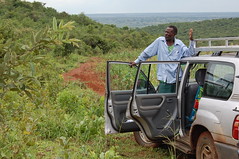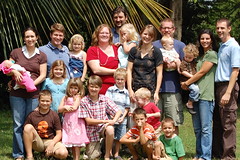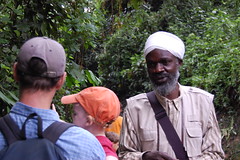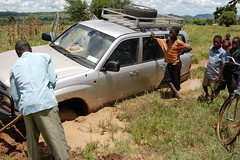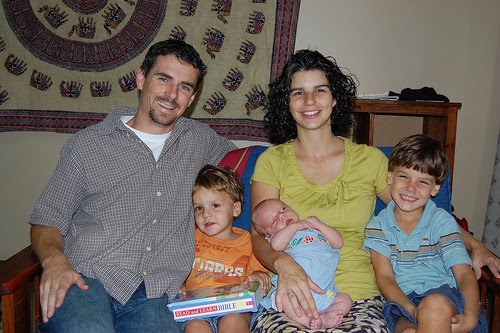Hey everybody. We have a new team website. Please drop by at www.missionmwanza.org.
Thursday, January 20, 2011
New team website!!!
Hey everybody. We have a new team website. Please drop by at www.missionmwanza.org.
Hey everybody. We have a new team website. Please drop by at www.missionmwanza.org.
Who is Lord of the Rain?
Heavy rains can be an inconvenience to our life here. Our laundry never has time to dry on the clothesline. The unpredictable electricity becomes more so. The slow internet stops working entirely. And the dirt roads turn into mud bogs.
Two weeks ago, while sliding on a wet path, I struck a sharp rock, puncturing the sidewall of one my tires. I struggled to get the Landcruiser to a safe, dry place for a tire change. Not long afterwards, the windshield wiper, fatigued from pushing mud out of my view, decided to break off (thankfully I found the main parts, and patched the wiper together with an old bicycle spoke, a.k.a. village duct tape).
But when I arrived at Nyabusang'wa with a mud-covered car, they were not sympathetic to my struggle to arrive at their church service. Rather, they were jealous of the other places that had obviously seen rain that had not reached their fields. It was a sentiment that could have been shared by nearly all of our churches—the current rains are two months late.
For our churches, this is a crisis, as people are struggling to make their food stores last until March, the earliest possible time for a harvest. And it is a spiritual ordeal, as some village leaders are coercing every household to contribute money for a sacrifice to the traditional rainmakers.
On this day, I preached a sermon that I’ve never heard in the states: Who is Lord of the Rain? People were very engaged as we compared biblical stories like Noah, Elijah, Job 37-38, Psalm 29, and Jesus in the storm with traditional beliefs of rain-making kings and droughts caused by social sin (like the birthing of twins). When we came to the question, “therefore, who should we turn to when we are concerned about rain?”, the answer was universal: “Mulungu”—the Sukuma word for God.
Of greater significance was the lunchtime conversation with three church leaders, as we talked about issues ranging from leadership, church discipline, and measuring the health of the churches in their cluster. This was the more significant aspect of my day--while I can occasionally come and teach about an issue like rain, it is these leaders that minister daily to new Christians struggling to keep their faith through times of trial.
(in addendum—we have experienced two weeks of heavy rain since this church visit. While our clothes are a little musty, we are thankful for the blessing sent by the Lord of the Rain.)
Heavy rains can be an inconvenience to our life here. Our laundry never has time to dry on the clothesline. The unpredictable electricity becomes more so. The slow internet stops working entirely. And the dirt roads turn into mud bogs.
Two weeks ago, while sliding on a wet path, I struck a sharp rock, puncturing the sidewall of one my tires. I struggled to get the Landcruiser to a safe, dry place for a tire change. Not long afterwards, the windshield wiper, fatigued from pushing mud out of my view, decided to break off (thankfully I found the main parts, and patched the wiper together with an old bicycle spoke, a.k.a. village duct tape).
But when I arrived at Nyabusang'wa with a mud-covered car, they were not sympathetic to my struggle to arrive at their church service. Rather, they were jealous of the other places that had obviously seen rain that had not reached their fields. It was a sentiment that could have been shared by nearly all of our churches—the current rains are two months late.
For our churches, this is a crisis, as people are struggling to make their food stores last until March, the earliest possible time for a harvest. And it is a spiritual ordeal, as some village leaders are coercing every household to contribute money for a sacrifice to the traditional rainmakers.
On this day, I preached a sermon that I’ve never heard in the states: Who is Lord of the Rain? People were very engaged as we compared biblical stories like Noah, Elijah, Job 37-38, Psalm 29, and Jesus in the storm with traditional beliefs of rain-making kings and droughts caused by social sin (like the birthing of twins). When we came to the question, “therefore, who should we turn to when we are concerned about rain?”, the answer was universal: “Mulungu”—the Sukuma word for God.
Of greater significance was the lunchtime conversation with three church leaders, as we talked about issues ranging from leadership, church discipline, and measuring the health of the churches in their cluster. This was the more significant aspect of my day--while I can occasionally come and teach about an issue like rain, it is these leaders that minister daily to new Christians struggling to keep their faith through times of trial.
(in addendum—we have experienced two weeks of heavy rain since this church visit. While our clothes are a little musty, we are thankful for the blessing sent by the Lord of the Rain.)
Wednesday, December 29, 2010
Wednesday, May 05, 2010
The Sukuma: do they eat people?
This is Wilberforce, a gentle old Luhya man who guided our family through the Kakamega rain forest in Kenya last month.
After learning a great deal from him, sampling wild leaves and berrys, spotting endemic bird species, and identifying local herbal remedies, the conversation turned to our work in Tanzania.
"OOOOH. The Sukuma. We hear that they eat people. Is this true?"
Having lived in Sukumaland for four years, I've yet to be eaten.
But he went on to other rumors. "we hear that the Sukuma have magical powers, even to raise people from the dead."
This, I had to concede, is true (at least in common belief). Traditional Sukuma religion has a strong belief in "the living dead", aka zombies, and there are countless stories of people being harrassed by zombies.
I asked him what else he knew of the Sukuma. He said that Kenya, Uganda, and Tanzania each had one tribe that was known for the strength of their magic and witchcraft. In Tanzania, it is the Sukuma people, and even the corresponding tribes in Kenya and Uganda can't compare to the Sukuma.
And this isn’t just the talk of old men in the forest. Major research seems to cast light on this issue. The Pew Trust recently released a report compiling research about the status of religion amongst all the nations of Africa.
The results were telling: Tanzania has the strongest incidence of traditional religion on the continent, as defined by the percentage of people that exhibit a majority of these traits:
…belief in reincarnation, witchcraft, evil spirits, the protective power of sacrifices to spirits or ancestors, juju or shrines, “evil eye” or curses, and the protective power of spiritual people as well as possession of traditional African sacred objects, participation in traditional ceremonies to honor ancestors, participation in traditional puberty rituals and use of religious healers.
 The study found that 62% of Tanzanians have a strong belief in traditional religion, far exceeding the neighboring countries of Kenya (11%), Uganda (18%), and Rwanda (3%).
The study found that 62% of Tanzanians have a strong belief in traditional religion, far exceeding the neighboring countries of Kenya (11%), Uganda (18%), and Rwanda (3%).
If the study focused on the Sukuma tribe, which comprises 15% of the Tanzanian population, the numbers would be much higher, perhaps over 80%.
This is not merely an issue of “religion”, as curses, witchcraft allegations, poison, albino kiilings, and constant fear all stem from this belief system, as does the pervasive suspicion and fatalism that binds this people.
Though Wilberforce was relieved to know that the Sukuma do not eat people, in a similar fashion the Sukuma religious system consumes the hopes, dreams, and future of millions of people.
This is Wilberforce, a gentle old Luhya man who guided our family through the Kakamega rain forest in Kenya last month.
After learning a great deal from him, sampling wild leaves and berrys, spotting endemic bird species, and identifying local herbal remedies, the conversation turned to our work in Tanzania.
"OOOOH. The Sukuma. We hear that they eat people. Is this true?"
Having lived in Sukumaland for four years, I've yet to be eaten.
But he went on to other rumors. "we hear that the Sukuma have magical powers, even to raise people from the dead."
This, I had to concede, is true (at least in common belief). Traditional Sukuma religion has a strong belief in "the living dead", aka zombies, and there are countless stories of people being harrassed by zombies.
I asked him what else he knew of the Sukuma. He said that Kenya, Uganda, and Tanzania each had one tribe that was known for the strength of their magic and witchcraft. In Tanzania, it is the Sukuma people, and even the corresponding tribes in Kenya and Uganda can't compare to the Sukuma.
And this isn’t just the talk of old men in the forest. Major research seems to cast light on this issue. The Pew Trust recently released a report compiling research about the status of religion amongst all the nations of Africa.
The results were telling: Tanzania has the strongest incidence of traditional religion on the continent, as defined by the percentage of people that exhibit a majority of these traits:
…belief in reincarnation, witchcraft, evil spirits, the protective power of sacrifices to spirits or ancestors, juju or shrines, “evil eye” or curses, and the protective power of spiritual people as well as possession of traditional African sacred objects, participation in traditional ceremonies to honor ancestors, participation in traditional puberty rituals and use of religious healers.
 The study found that 62% of Tanzanians have a strong belief in traditional religion, far exceeding the neighboring countries of Kenya (11%), Uganda (18%), and Rwanda (3%).
The study found that 62% of Tanzanians have a strong belief in traditional religion, far exceeding the neighboring countries of Kenya (11%), Uganda (18%), and Rwanda (3%). If the study focused on the Sukuma tribe, which comprises 15% of the Tanzanian population, the numbers would be much higher, perhaps over 80%.
This is not merely an issue of “religion”, as curses, witchcraft allegations, poison, albino kiilings, and constant fear all stem from this belief system, as does the pervasive suspicion and fatalism that binds this people.
Though Wilberforce was relieved to know that the Sukuma do not eat people, in a similar fashion the Sukuma religious system consumes the hopes, dreams, and future of millions of people.
Saturday, April 10, 2010
Thursday, April 08, 2010
Opening Day
We celebrated opening day 2010 with an intense baseball game in our front yard with our teammates. Parents vs. Kids.
Final score: 6-1.
We were held to one run in the ninth inning by the defense of Matthew Guild (first unassisted double play in the history of MLB--Mwanza League Baseball) and the ace pitching of Trey Bailey.
The offense was too much for us, with Josiah's power hitting and Anna Guild's keen base running. Elijah, just called up from the rookie league to provide a left handed hitter, supplied two key singles and slid into every base at least once.
The highlight of the game may have been Rayna and Faith Bailey (unpictured) doing the wave from the grandstands.
All the parent's have subsequently been placed on the trading block.
Final score: 6-1.
We were held to one run in the ninth inning by the defense of Matthew Guild (first unassisted double play in the history of MLB--Mwanza League Baseball) and the ace pitching of Trey Bailey.
The offense was too much for us, with Josiah's power hitting and Anna Guild's keen base running. Elijah, just called up from the rookie league to provide a left handed hitter, supplied two key singles and slid into every base at least once.
The highlight of the game may have been Rayna and Faith Bailey (unpictured) doing the wave from the grandstands.
All the parent's have subsequently been placed on the trading block.
Thursday, October 29, 2009
half way home
Here's my newest friends on the side of the road waiting for the minibus (daladala) to stop overheating. We stopped by a pond so that the driver and conductors could fetch water and pour into the radiator (located under the front seat).
It took a ride on the back of a bicycle, and three minibuses to get home, but I successfully reduced my carbon footprint.
I also understand a little more about dependency on God--and others--to meet my needs, as I did not have my car to get me home that day.
(Our car is fine, by the way--it was being used by our teammates who had to make a trip to Nairobi.)
It took a ride on the back of a bicycle, and three minibuses to get home, but I successfully reduced my carbon footprint.
I also understand a little more about dependency on God--and others--to meet my needs, as I did not have my car to get me home that day.
(Our car is fine, by the way--it was being used by our teammates who had to make a trip to Nairobi.)
Monday, October 19, 2009
Lusiya and her husband Matayo are well known to anyone who has visited us in Sukumaland. Rarely will you find a better smile, a smile that is regularly displayed as she expresses remarkable hospitality.
Lusiya and Matayo are hosting a marriage seminar October 31st --November 1. It's a sign of worldview shift--that a voice like Lusiya's is worthy to be heard, and that men here would consider that they might have something to learn about marriage.
Lusiya and Matayo are hosting a marriage seminar October 31st --November 1. It's a sign of worldview shift--that a voice like Lusiya's is worthy to be heard, and that men here would consider that they might have something to learn about marriage.
With just 5k to go, Jason, Eric, and I (and our American friends Dan and Dave) are just a stride behind some world class athletes.
Note new luxury hotel going up in the background, at the intersection of Posta and Kenyatta Roads.
Note new luxury hotel going up in the background, at the intersection of Posta and Kenyatta Roads.
